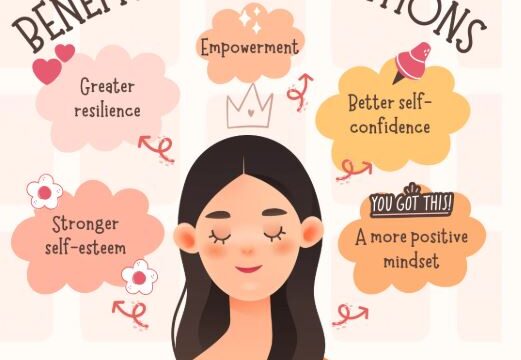Setting healthy boundaries is one of the most important ways to protect your emotional wellbeing and strengthen your relationships.
Yet for many people, the idea of saying “no” or expressing personal limits feels uncomfortable or even selfish.
Affirmations can gently shift this mindset by reminding you that boundaries are not barriers—they are expressions of self-respect.
When you practice positive statements that reinforce your worth and needs, it becomes easier to communicate clearly, stay grounded, and create a balanced life.
Affirmations are powerful because they reframe how you speak to yourself. They train your mind to replace guilt, fear, or self-doubt with confidence and calm assurance. Over time, this inner dialogue influences your choices and behavior. By focusing on affirmations that support healthy boundaries, you start to honor your own time, energy, and emotions in a way that also allows you to show up authentically for others.
One of the most important affirmations to begin with is, “I have the right to say no without feeling guilty.” Many people grow up believing that saying no is rude or unkind. In truth, saying no is a way of respecting yourself and preventing resentment from building up. When you repeat this affirmation, it helps you trust that your needs are valid and that you can decline requests gracefully. You are not responsible for everyone’s happiness, and setting limits does not make you unkind—it makes you honest.
Another helpful statement is, “My boundaries protect my peace and energy.” This affirmation reminds you that personal space is not about exclusion; it is about preservation. When you constantly give your time and energy away without considering your limits, you can quickly become drained and disconnected from yourself. By affirming your right to protect your peace, you strengthen your emotional resilience and maintain clarity in how you interact with others. This mindset allows you to engage with people more meaningfully, without feeling overextended.
A third affirmation to practice is, “I am responsible for my emotions, and others are responsible for theirs.” This statement helps you release the tendency to absorb other people’s feelings or take on their problems as your own. Healthy boundaries mean recognizing where you end and someone else begins. You can still offer empathy and support, but you do not need to fix or control another person’s emotional state. Affirming this regularly builds emotional independence and prevents burnout in relationships.
A beautiful way to strengthen your self-worth is to affirm, “I deserve relationships that respect my boundaries.” When you truly believe this, you start to attract and maintain connections that value mutual respect. People who appreciate your boundaries are often those who have a healthy sense of their own. This affirmation encourages you to seek relationships built on trust, openness, and understanding rather than obligation or guilt.
You can also say, “It is safe for me to stand up for myself.” Many people fear that expressing boundaries will lead to rejection or conflict. However, speaking up for your needs is not an act of aggression—it is an act of courage. This affirmation helps you find the confidence to express your limits calmly and clearly. Over time, you will notice that most people respect honesty more than silent resentment.
For moments when you feel uncertain about your limits, try affirming, “I listen to my body and my feelings to know when to step back.” Boundaries are not only emotional; they are physical and mental as well. Your body often sends signals when you are overwhelmed or uncomfortable. By paying attention to these cues, you learn to recognize when rest, space, or solitude is needed. This affirmation strengthens your connection to your intuition and helps you respond with care instead of exhaustion.
When you want to maintain your sense of self in close relationships, you might use the affirmation, “I can love and care for others without losing myself.” It reminds you that genuine care comes from a full heart, not from self-sacrifice. You do not have to give up your identity, dreams, or comfort to be kind. Healthy boundaries allow you to love freely while maintaining balance and self-respect.
In professional settings, affirmations like “My time and skills are valuable” can be especially empowering. It encourages you to set boundaries with your workload, communication, and availability. When you respect your time, others are more likely to do the same. This mindset prevents burnout and helps you maintain consistent focus and productivity.
Another simple but effective affirmation is, “I do not need to explain or justify my boundaries.” It is common to feel pressure to defend your limits, but in truth, a respectful boundary needs no apology. When you trust your judgment and speak from a place of self-assurance, people sense your confidence and are more likely to accept your decisions.
Affirmations are most powerful when practiced consistently. You can say them aloud in front of a mirror, write them in a journal, or repeat them silently during moments of stress. The goal is to integrate these statements into your daily routine until they become second nature. Over time, they shape your beliefs about what you deserve and how you want to be treated.
As you continue using affirmations, you may notice changes in how you respond to others. You might pause before saying yes, take a breath before reacting emotionally, or feel more comfortable expressing your needs. These small moments are signs of growth. They show that you are creating space for healthier relationships and a more peaceful inner life.
Healthy boundaries are not walls that keep people out—they are gentle guides that show others how to treat you. They create an environment where respect, honesty, and emotional safety can flourish. Affirmations simply give your inner voice the courage to maintain those boundaries with compassion.
With practice, these affirmations help you develop a calm confidence that allows you to live more intentionally. You begin to choose where to invest your energy, how to respond to challenges, and which relationships truly support your wellbeing. Every time you affirm your right to peace, space, and respect, you strengthen your foundation for a balanced and fulfilling life.
In the end, affirmations that encourage healthy boundaries are not just words; they are acts of self-care. They remind you that your needs matter, your feelings are valid, and your limits deserve to be honored. By nurturing this mindset, you build a more authentic connection with yourself and with others—a connection rooted in mutual respect, kindness, and understanding.






